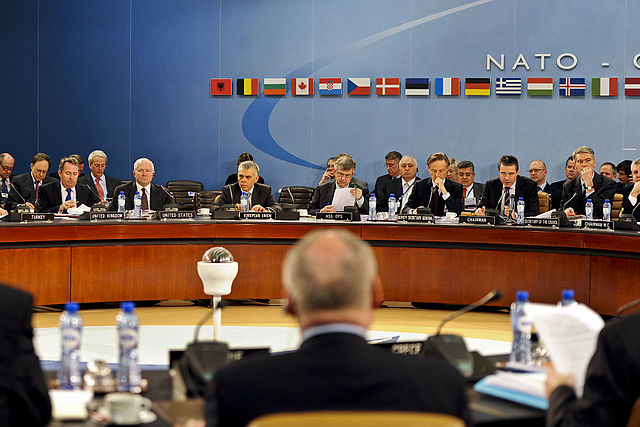
Photo Credit: Cherie Cullen, DoD
In a recent column in the Wall Street Journal, outgoing NATO Secretary General Anders Fogh Rasmussen noted that Russia and the Islamic State of Iraq and Syria challenge the institutions, indeed the very values, of liberal nations. He advocated a NATO build up in order to “preserve our freedom, protect our people, and promote our values.” Rasmussen does a service to suggest this mission statement for NATO. His logic should be taken further, though.
The ultimate threat to the West is philosophical. Neither Russia nor ISIS, nor, outside of NATO’s scope, China, can cripple the Western nations, but we can damage them badly. Our differences arise over religious tenets, political systems, or nationalist claims. All place some value above personal liberty, which they see as a problem. They view their illiberalism, in creed-based moral codes, social structures, or economic discipline, as strengths.
The concept of freedom is the essence of Western values, and liberalism’s governing ethos. Liberal societies need to show themselves competent in protecting basic human rights in order for freedom to prove viable. Right now some adversaries look very competent in some ways, while we look incompetent in too many, raising questions about liberalism’s value.
ISIS’ appeal is limited by its brutality, but it has made Western states look irresolute in their Middle East policy. The shock of terrorism, a key part of ISIS’ image, makes Western governments look incapable of protecting their citizens abroad. Military strikes aimed at stopping terrorist acts or impeding ISIS’ military progress are not sufficient. A long-term campaign is needed to apply military, economic, and political efforts against ISIS — but above all to show the West capable of defending liberalism as an ideal. We should also act judiciously: It may be best for us to let other Muslim societies take the lead in destroying ISIS to degrade its claim to represent Muslims rather than one more movement destroyed by Western power.
Meanwhile, Russia has limited but real capacity to discredit the West. Their nuclear arsenal is checked by ours; their ideology is a singular nationalist appeal rather than Communism’s universal claim; and their economic and conventional military strength is diminished since the Cold War. Still, Putin’s “hybrid war” on Ukraine follows a coherent strategy meant to blunt Western influence. Citing geographic security, Slavic affinity, and Ukraine’s own weak institutions, he justifies Russian pressures as resistance to an encroaching West. He mobilizes Russia’s local geopolitical advantages to disrupt Ukraine’s politics and expose the limits of Western support. The West’s weak response and the EU’s initial approach to Ukraine make Liberal countries look opportunistic, unfaithful to Ukraine, superficial in our democratic principles, and gratuitously hostile to Russians.
China also has limited geopolitical, and even financial, reach. But its authoritarian practice seems more effective for economic management than Western nations’ Liberalism. Geopolitically, China, like Russia, claims a natural interest in adjacent territories, casting the West’s interest in the South China Sea as imperialistic. At the same time, exercising this claim, they raise the specter of their own desire for hegemony, which, tied to their own non-democratic system and their assertion of it for Hong Kong, threatens Liberal values.
Military alliances are necessary, but are not enough to defend the liberal community. It must also support its populations’ well being, and maintain law and order.
More action is needed. Liberalism, and the freedom that its tenets defend, leaves the search for ultimate truths and morals to individuals. Disorderly conduct and dysfunction arise easily in liberal environments, and communication technology instantaneously showcases our difficulties for the whole world. Free peoples need to show that freedom does not dissipate the discipline needed to preserve free societies, and that free people pursue real value rather than license. Liberal states need to exhibit these qualities, in conduct that consistently supports and embodies our principles.
A philosophical or moral issue requires a moral campaign. Rasmussen is right: Build up NATO in order to “preserve our freedom, protect our people, and promote our values.” We should not only build up NATO but extend it into a global vehicle for the collective defense of liberalism.
But military defense is only one aspect of the campaign. We need, in Paul Berman’s term, to make the defense of freedom a “mental wa,r” in which military defense, economic expansion, development aid, and political outreach are all tools. Ultimately, underlying all these measures, we, the free people of the world, need to use our freedom well, and live meaningfully.